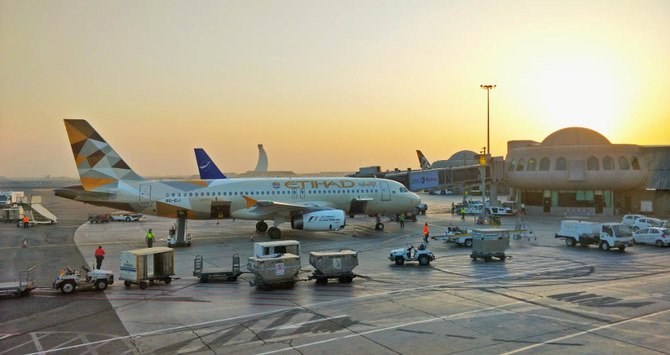DUBAI: Emirates and Etihad Airways, the UAE’s two largest carriers, said they will resume transit flights as the country’s key aviation sector slowly emerges from pandemic paralysis.
Dubai-based Emirates said on Thursday it will operate transit flights to 29 destinations by June 15, while Abu Dhabi’s Etihad said it would transit passengers to 20 destinations from June 10.
Dubai and Abu Dhabi have become key global layover hubs for passengers moving between Asia, Europe and the Americas and the resumption of transit services is an important step toward returning the cities’ two vast and modern airports to normal operations.
It comes more than two months after the UAE stopped all passenger flights in response to the coronavirus pandemic. Foreign citizens without UAE residency remain banned from flying to the country.
Emirates said it would also offer flights to Bahrain, Manchester, Zurich, Vienna, Amsterdam, Copenhagen, Dublin, New York JFK, Seoul, Kuala Lumpur, Singapore, Jakarta, Taipei, Hong Kong, Perth and Brisbane.
“Customers can book to fly between destinations in the Asia Pacific and Europe or the Americas, with a convenient connection in Dubai, as long as they meet travel and immigration entry requirements of their destination country,” Emirates said.
Meanwhile, Etihad said transfer connections via Abu Dhabi will now be available from Jakarta, Karachi, Kuala Lumpur,
Manila, Melbourne, Seoul, Singapore, Sydney, and Tokyo to
major cities across Europe — including Amsterdam, Barcelona, Brussels, Dublin, Frankfurt, Geneva, London Heathrow, Madrid, Milan, Paris Charles de Gaulle, and Zurich.
Other major carriers are also slowly resuming services as some governments discuss the possibility of opening limited “air bridges” to allow for the possibility of overseas vacations.
Virgin Atlantic said on Thursday it would restart some flights that had been grounded with further services planned for August. It said that flights to Orlando and Hong Kong from London Heathrow would resume on July 20. New York JFK, Los Angeles, and Shanghai are set to restart on July 21.
Global aviation body IATA has warned that post-coronavirus fare discounting was delivering an added financial blow to carriers.
“Airlines need cash because of the crisis and they’re seeking to encourage passengers into seats by offering low fares,” said IATA Chief Economist Brian Pearce.
Carriers reduced domestic fares by an average 23 percent last month according to IATA.


















